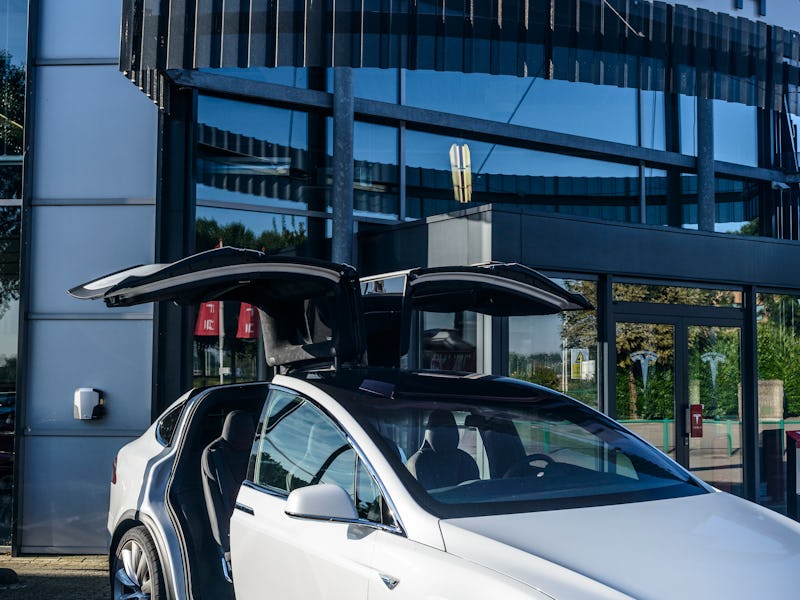The privacy of self-driving cars could be at stake a new scooter lawsuit
The suit challenges how one city measures scooter data. The repercussions could be wide-ranging.

After months indoors, the mass arrival of protestors on American streets has meant an increase in transportation, including the trendy scooters from JUMP, Lyft, Lime and others. But as cities try to grapple with this new mode of transportation, a battle over data from these scooters is being taken to the next level. The Electronic Freedom Foundation and the ACLU are teaming up to sue the city of Los Angeles to stop it from collecting data on the scooters that whiz about the city.
"This is galling and improper, especially at a time when protests are erupting around the country."
At issue is a metric developed by the L.A Department of Transportation (LADOT) known as its “mobility data specification” program, or MDS. Since 2018, MDS has collected and communicated scooter data in near-real time on scooter trips, or as they’re referred to in the world of civic data, “micro-mobility.”
LADOT notes in a fact sheet that that its MDS data is open-source, “fosters a competitive market for companies to develop products as a service in cities by creating a single platform where everyone is invited to participate and build,” and follows “to best practices for privacy standards,” saying it protects, “above all else,” the privacy of any citizens who use scooters.
Lime scooters. Data that Los Angeles collects about their usage is at the heart of a new lawsuit.
That’s not what Hannah Zhao, an attorney for the EFF, thinks. The Foundation thinks that the exacting standards of MDS, which can nail destinations down to within a few feet, are cause for concern.
“Route data can reveal detailed, sensitive, and private information about riders, such as where they live, who they work for, who their friends are, and when they visit a doctor or therapist,” Zhao says in a press statement. “The city is collecting this information, in violation of the Fourth Amendment, as an experiment. This is galling and improper, especially at a time when protests are erupting around the country and privacy protections for those exercising their free speech rights on the streets has taken on new importance.”
Ridership for the scooters has taken a hammering in 2020. Even before the novel coronavirus and Covid-19 turned the world upside down, ridership for the once-trendy mode of transportation had taken a hit. A study released on March 2nd by the University of Southern California shows that in the region, 94% of residents said they did not use a scooter at all, and when presented with the option of either having more or less of them in their neighborhood, 40% offered no opinion at all. So people were not exactly burning with passion when considering scooters.
And a few weeks later, as the Covid-19 pandemic created transportation models previously thought impossible—ones where the number of riders were vastly reduced. Interest in shared scooters evaporated nearly overnight, with the New York Times finding in April, through looking at credit card data, that interest had plummeted approximately 100%. Major players like Bird and Lime have suffered layoffs, and companies seem more interested in getting a return on investment than improving transportation in a time of crisis, according to experts.
After a trendy wave, scooters have mostly failed to catch on in Los Angeles. But as Covid-19 changes the economy, so could scooters.
But a current downturn is no reason to think that scooters might be down and out for good. A study from April predicts 4.6 million vehicles by 2024, and if a global recession proves to threaten car purchases around the world, the industry could find its momentum yet again.
If and when that moment of scooter activation arrives, the current fight over MDS will play a large factor in determining the future of the industry. And it’s not just scooters: this sort of pin-pointed data could play a role in how cities monitor cars with autonomous capabilities, like Teslas. EFF Surveillance Litigation Director Jennifer Lynch sees potential for a slippery slope, moving from legitimate regulation into the government keeping tabs on a person’s every move.
“The city plans to extend its use of MDS to collect minute-by-minute route data for ride-hailing and car-sharing services and driverless cars. It’s one thing to seek to regulate these new technologies—it’s another thing to obliterate citizens’ rights to keep their everyday travels private to do so. We think the courts will agree,” she says in a statement.
This article was originally published on